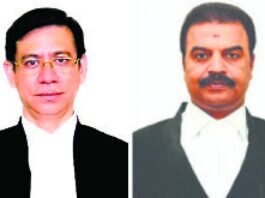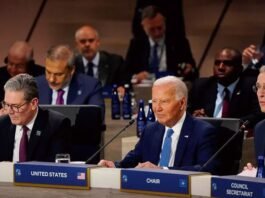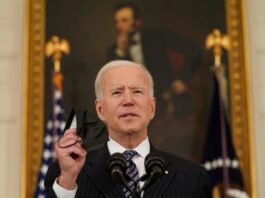![]()
Oxygen-related equipment and supplies is a major focus of the European Union’s (EU) efforts to strengthen India’s Covid-19 response but vaccines need to be developed early and in sufficient quantities to decisively defeat the Coronavirus, EU ambassador Ugo Astuto said on Thursday.In an interview with Hindustan Times, Astuto outlined efforts by EU member states under the bloc’s Civil Protection Mechanism to support India fight a devastating second wave of infections. He also looked forward to key areas that will be in focus during the virtual India-EU Summit next month and the EU’s efforts to strengthen its presence in the Indo-Pacific.The EU stands in full solidarity with India. There is a major scale operation ongoing, which is still developing. We have now activated the EU Civil Protection Mechanism to offer support in this difficult moment. The mechanism is coordinating efforts of member states that can provide urgently needed materials and supplies. As Team Europe, we can offer the advantage of a joint action. We have already received very concrete offers by several member states. A delivery is arriving from Romania; another plane from Ireland is about to land very soon. Ireland has expressed the intention to send 700 oxygen concentrators, one oxygen generator, and 365 ventilators; Belgium: 9,000 doses of the antiviral medicine Remdesivir; Romania: 80 oxygen concentrators and 75 oxygen cylinders; Luxembourg: 58 ventilators; Portugal: 5,503 vials of Remdesivir and oxygen; Sweden: 120 ventilators.We work very closely with the government of India. As friends and partners, we have offered our support. There has been a conversation on how best we could help. As a result of this conversation, we have activated the EU Civil Protection Mechanism. The Centre ensures rapid deployment of emergency support through a direct link with national civil protection authorities. Through this mechanism, the EU can coordinate the response to emergencies in Europe and beyond. A joint approach — as Team Europe — helps to pool expertise and capacities. The EU Civil Protection Mechanism can also help with the transport and pooling of resources.Oxygen is a major focus of our support, as requested by Indian authorities. As to what to do for the future, this pandemic has shown how vulnerable the world is and how interconnected. The international community must come together and offer shared solutions, based on multilateralism and global solidarity. This is true for the Covid epidemic. It is true also for other global challenges, such as the fight against climate change or biodiversity loss. Incidentally, biodiversity loss appears to be one of the factors that can lead to the spread of new viruses.To prepare for the future, we need to draw lessons from the experience so far. It is clear that to defeat the virus decisively, we need to develop vaccines early and in sufficient quantities. We also need to strengthen the capacity of the international community to respond in a cohesive and consistent manner. We have to strengthen the multilateral tools we have already at our disposal, such as the WHO, and possibly think about new tools specifically targeted to pandemics, such as for instance an international treaty on pandemics. In short, we need to come together and find common responses. The EU and India can help in shaping the global agenda in this respect.
As the world’s two largest democracies, the EU and India share the same values and principles and a strong commitment to a rules-based world order. Against this background, our strategic partnership has gained considerable momentum in the past couple of years. At the last summit, our leaders decided to further strengthen and broaden the scope of our cooperation and to work closer together to defend multilateralism, combating climate change, greening our economies, securing our digital future, fostering connectivity and collaborating on political and security related issues. A common road map to 2025 was adopted to guide our joint action over the next five years, towards concrete deliverables.
I trust that the next leaders’ meeting will mark further progress in all of these areas. For instance, the EU and India are currently preparing a joint EU-India Connectivity Partnership. At our summit in July 2020, we agreed to promote jointly a transparent, inclusive and rules-based approach to connectivity. We agreed that connectivity projects should be environmentally, socially and fiscally sustainable, providing a level playing field for businesses. Finally, we underscored the key role of the private sector and the importance of incentivising sustainable private financing. India and the EU can be natural partners in the development of this shared vision.
Another major priority I would like to highlight here is the fight against climate change, in the run-up to COP 26. India has achieved significant results in shifting towards a greener economic model. When it comes to renewable energy, especially solar, India has been a trendsetter. Science tells us that the international community as a whole needs to be more ambitious if we want to address the existential issue of climate change. Temperatures are rising and we need to act now, for the sake of future generations. The fight against climate change and against biodiversity loss is a global endeavour – and to succeed, our EU-India strategic partnership is essential.
The green and digital transition are twin priorities for both the EU and India. As open societies and democracies, the EU and India can work together to make sure that the digital transition takes place in a secure context, conducive to fair competition and in full respect of individual rights and freedoms. For instance, when it comes to data protection, GDPR is often evoked as a relevant precedent. We have established a productive dialogue to promote normative convergence, as the free flow of data is in the interest of both sides.In the wake of Covid, countries are looking at ways to diversify supply chains and make them more secure. In this context, India is positioning itself as a prominent investment destination. The EU is already one of India’s largest trade partners and a major investor. However, if you look at the size and potential of our respective markets, we could definitively do more. We would be ready to start exploring a standalone investment agreement, as we believe it would be in our mutual interest to establish a stable legal framework for investments, which would give a positive signal in both directions. The summit last year established a high-level dialogue on trade and investmentExecutive vice president Valdis Dombrovskis and commerce minister Piyush Goyal met for talks in February and are about to meet again. They will discuss the perspective of trade and investment agreements, but also the wider economic agenda. There is significant scope for broader exchanges and cooperation on issues such as reform of WTO, security of supply chains, regulatory issues.The EU is the number one investor and among the biggest traders in the Indo-Pacific region, stretching from the east coast of Africa to the Pacific Island states. The region is home to 60% of the world’s population and responsible for two-thirds of global economic growth. It is a crucial manufacturing hub, central to global value chains, at the forefront of the digital economy. The region is also key for climate change and the environment, for the achievement of the objectives of the Paris agreement. In many ways, the path of the future world will be set in the Indo-Pacific region.
The EU Council Conclusions adopted just a few days ago make it very clear: the EU regards itself as a major stakeholder in this region and wants to work with like-minded partners, such as India.
The aim of the future EU strategy for the Indo-Pacific is to contribute to regional stability, prosperity and sustainable development. The EU has decided to reinforce its strategic focus in the Indo Pacific, to support stability, prosperity and sustainable development in the region, based on the promotion of democracy, rule of law, human rights and international law.
The EU will further develop its partnerships with India on foreign policy, security and defence aspects. This will include addressing challenges to maritime security, as well as from emerging and disruptive technologies, but also countering terrorism or organised crime.We will continue to enhance convergences and to work together with India to foster the rules-based world order.









